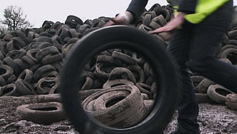Catching up with UK's industrial scale fly-tippers - Tire Pyrolysis a Solutions
 Millions of used tyres that motorists have paid to have recycled are instead being dumped in the British countryside. The BBC’s Panorama programme has been tracking the big money business that has been described as fly-tipping on an industrial scale.
Millions of used tyres that motorists have paid to have recycled are instead being dumped in the British countryside. The BBC’s Panorama programme has been tracking the big money business that has been described as fly-tipping on an industrial scale. Motorists know the drill. You get new tyres on your car and you pay the garage a “green fee” to dispose of the old ones - typically between £1 and £2 per tyre.
Garages then use some of that money to pay a middleman to take the tyres away and recycle them.
Used tyres can be shredded and burned for fuel in a controlled environment. They can also be baled and used to line landfill sites to prevent toxins leaking into groundwater.
In addition, there is a hungry export market for used tyres to fuel industry abroad, particularly in Asia.
Taxpayer billed
But vast illegal dumps have sprung up as criminal gangs simply collect the tyres - and the money from garages - and dump them, often on unsuspecting landowners who have rented out disused farm buildings for storage.
In Yorkshire, one illegal dump contained 300,000 tyres and in Hampshire last year, more than 2 million tyres were abandoned.
In North Wales, landowner Maria Burt fell victim to a tyre-recycling scam run by Amy and Steven Marlow.
Mrs Burt had more than 25,000 tyres dumped in a warehouse on her land in a matter of weeks and was left with a £30,000 clean up bill after the Marlows disappeared.
“Every morning you wake up and you think ‘I’ve got to get rid of those tyres. How do I do it? I haven’t got the money.’”
She had to borrow most of that money from friends and family.
The rest of the clean up bill was paid by the Environment Agency - the taxpayer - as the tyres posed a fire risk
The BBC’s Panorama programme tracked the Marlows to Majorca, where they were leading an expat lifestyle in the sunshine. Mr Marlow, a would-be musician, had changed his name to Stevie Reye and was singing in a band. They declined to comment on the tyres they had left Mrs Burt and others to deal with.
Overseas gangs
When the Environment Agency does step in to clear up massive tyre mountains, many of them end up being shipped abroad.
The UK government allows tyres to be sold abroad to be burnt for fuel - but only to countries that place environmental controls on factory emissions, including Malaysia and South Korea.
That demand is growing and UK-tyre recycling firms are now experiencing a shortage of supply as they are being undercut by firms from Asia wanting to buy Britain’s used tyres by the millions.
But Panorama has also found evidence that tyres sold for export are being smuggled in their millions into Vietnam and China via Malaysia and other approved countries.
Andy Highman of the Environment Agency said: “We are talking about serious and organised criminals. We are talking about major, major money can actually be made.”
A British company called Trading 128 offered to export all the tyres collected by a tyre-recycling firm in Devon to its recycling plant in Malaysia.
But Panorama discovered the Malaysian factory did not exist. Documents obtained by the programme further revealed that a shipping partner of Trading 128 was in fact sending the tyres on to Vietnam - an illegal destination for British tyres.
In Vietnam, parts of the waste tyre business are controlled by organised crime gangs who smuggle the tyres into China where they are burnt in unregulated kilns and furnaces to make ceramics.
Which is about as far away as you can get from the forecourt of a British garage where motorists are handing over their so-called “green fee” to have tyres safely recycled.
Defra, the government agency that oversees tyre recycling, said in a statement that it was up to the market to regulate this area.
Speaking for the industry, Peter Taylor of the Tyre Recovery Association said self-regulation works, but called for more funding for the Environment Agency to do the job of enforcement.
“If some people on the margins of our business decide to disregard their duty of care, and if the enforcement regime is inadequate, then we will continue to have problems,” he said.
Critics say the market has failed to ensure more of the “green fee” that motorists are paying goes towards a UK-wide recycling programme.
Jeff Cooper of the International Solid Waste Association, said: “If the green fee collected was reinvested into the recycling system…you might have seen more use of tyres in a wider variety of energy recovering facilities.”
You can return to the main Market News page, or press the Back button on your browser.

